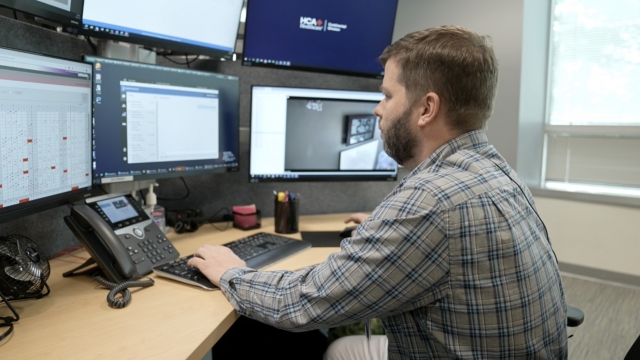The sounds of one virtual care center transport you to the inside of a hospital room. However, health care professionals at HealthONE's new virtual care center are actually miles away, working from an office building.
Division director Melissa Skinner explains that it's a new, innovative concept where registered nurses are using technology to enhance care.
"We wanted to really look at how we've used technology and innovation in each of our hospitals and how can we centralize that," Skinner said. "I really hope to see that a nurse can go into a patient room, have support from multiple avenues from a virtual care standpoint, and they can be able to spend and do the best care that they can possibly do at the bedside and spend time with that patient, and we can handle all the other pieces that are all essential to the care of the patient but doesn't necessarily have to be that one person."
Virtual RNs provide 24/7 monitoring of hospital patients by webcam. They are watching vitals, doing paperwork, and even observing cardiac monitors. They can immediately notify an in-person staff member if care is needed.
SEE MORE: Finding solutions to address nursing shortage
"We monitor our patients by camera for any kind of safety issue that might come up," Skinner said.
Centers like this allow for research and understanding that can't take place in the chaos of a hospital. Virtual RNs like Michael Hayden are experiencing that firsthand.
"I've learned a lot since I started this job. Things that I never had the time on the floor to dig into," Hayden said.
He spent nearly eight years as an ICU nurse, but burnout followed in the midst of the pandemic. He was considering leaving nursing entirely when he stumbled upon this opportunity to be a part of what they call the guardian system.
"What we do is take a deep dive into all the data. Our job is basically 100% data-driven. So we're looking at the charts and the trends of those labs and vitals, and we're looking at the orders from the physician and trying to see if there's something we're not doing that we need to be doing for this patient," Hayden said.
In the last year, they have responded to nearly 30,000 alerts. When they have intervened, less than 1% have gone to a higher level of care. Studies have found that hundreds more people die every year in hospitals where emergency rooms are crowded. These technological advancements can help prevent that from happening.
SEE MORE: Telehealth improves access to rural sexual assault nurse examiners
"We have the luxury of really taking a step back and taking that deep dive that the nurse at the bedside just does not have the time to do," Hayden said.
Command centers like this improve the quality of care that's possible, but they also alleviate stress on hospital staff. Hayden says if this concept expands across the country, patients will be better taken care of, and understaffed hospitals may become less of an issue.
"People are living longer and longer with more significant issues, which has been a strain on the amount of people you need to take care of, so any technology you can leverage to sort of amplify your ability to touch patients and help is going to be hugely important," Hayden said.
Virtual care centers give us insight into what the future of health care can be when combined with advanced technology.
Trending stories at Scrippsnews.com





